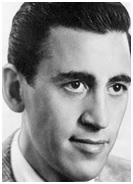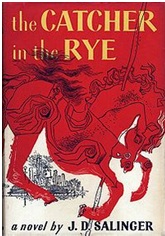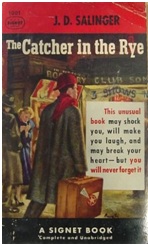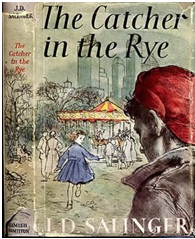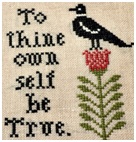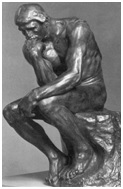|
 |
|
 |
|
|
||
The Catcher in the Rye - Happiness and Ethics
The Catcher in the Rye (1951) Classic novel about teenager, Holden Caulfield, written by the American, J.D. (Jerome David) Salinger (1919-2010), pictured right.
Fun facts
Major characters Holden Caulfield, tall (6 feet, 6 inches), skinny and shy 16-year-old American schoolboy and the story’s narrator Sally Hayes, his girlfriend Phoebe Caulfield, his ten-year-old sister Mr Antolini, his English teacher
The story The book is told in flashback by a 16-year-old boy, Holden Caulfield, to his psychoanalyst in a mental hospital about the few days before Christmas after the end of term at his boarding school in 1950’s Pennsylvania. Having been expelled for failing 4 out of 5 of his classes, Holden visits his elderly history teacher, Mr Spencer, to say goodbye. But, he is annoyed when Spencer criticizes him for his poor academic performance. Holden then fights his roommate, Ward Stradlater, because he is dating his ex-girlfriend, Jane Gallagher, whom Holden still likes. He questions him insistently about whether he tried to have sex with her and attacks him after being teased. This fight makes him determined to leave school early and go to Manhattan, New York City where his family lives. He arrives at a hotel there, after annoying the cab driver by asking him where the ducks in Central Park go in the winter. In the opposite hotel wing, he sees a male guest dressing up as a woman, and a couple hysterically spitting drinks at each other. He interprets this as sexual foreplay and is both aroused and annoyed by it. He then calls Faith Cavendish, a friend’s acquaintance, whom he believes is a stripper and will have sex with him. She agrees to see him the next day, but he backs out. He goes down to the bar where he flirts and dances with three women in their 30’s and feels he is “half in love” with the blonde one. But they joke about his age and leave him to pay the bill. He remembers his ex-girlfriend, Jane Gallagher, who allowed him to kiss her on her face but not on her lips. A cab driver (whom he also asks about the ducks) takes him to Ernie’s jazz club in Greenwich Village, where he critically observes the other customers. He meets Lillian Simmons, one of his older brother’s ex-girlfriends, who invites him to sit with her and her date. But, feeling awkward, he says he has to meet someone and walks back to his hotel, lonely and depressed. Maurice, the hotel elevator operator, offers to send a prostitute to Holden’s room for five
dollars and he agrees. A teenager, calling herself Sunny, arrives at his
door. She pulls off her dress but Holden feels “peculiar” and tries to make conversation with her. He claims he has had recent back surgery and can’t have sex with her. But he pays her anyway. She returns with Maurice, demanding another five dollars. When he refuses to pay, Maurice punches him in the stomach and leaves him on the floor, while Sunny takes five dollars from his wallet. The next morning (Sunday) he gives two nuns ten dollars at a sandwich bar and meets Sally Hayes, an ex-girlfriend. They split up after Holden insults her and suggests they run away and live in a log cabin. He again fails to contact Jane and then calls Carl Luce, his old student adviser and now a university student. They meet in a bar but Luce leaves in disgust after Holden makes some juvenile remarks about homosexuals and Luce’s Chinese girlfriend. Holden, now drunk, sneaks into his parents’ Manhattan apartment. He wakens his sister, Phoebe, who is mad at him for being expelled. When he tries to explain why he hates school, she accuses him of not liking anything. He tells her his fantasy of being “the catcher in the rye” who catches little children as they are about to fall off a cliff, while playing in a rye field. He then calls his old English teacher, Mr Antolini, who invites him to his apartment. He
asks Holden about his expulsion and advises him to live humbly with realistic aims. Holden falls asleep on his couch and awakens to find Antolini stroking his forehead. Thinking he is a homosexual, he leaves abruptly and sleeps for a few hours on a bench at Grand Central Station. The next day he goes to Phoebe’s school, sending her a note that he is moving out West and she should meet him at the Museum of Natural History. She arrives there, carrying a full suitcase of clothes, and asks him to take her with him. He refuses angrily and so upsets her that he agrees not to leave home. He then happily watches her ride on a carousel at the zoo. Holden finishes his story there, refusing to say how he went home and got “sick”. He plans to go to a new school in the fall and is cautiously optimistic about his future.
What are its lessons for happiness and ethics? 1. Fight phoniness Holden:
2. People aren’t perfect Holden idealizes some people (like Phoebe) and ignores their weaknesses. But, after his conversation with Mr Antolini, he begins to realize that people aren’t perfect and sometimes “phony” (see point 1) 3. Live well and don't self-destruct Mr. Antolini tells Holden that happiness is dependent on:
Holden must reject his self-destructive isolation that results from his:
4. Face reality The “Caul” in Holden’s surname is a membrane that covers the head of a foetus during birth. This represents his constant running away from the emotional complexities of adult life like:
For example, he asks Sally to run away to a log cabin. To avoid facing reality, he lives in a fantasy world, clinging on to the innocence of childhood. So he wants to be a “catcher in the rye” who stops children falling off a cliff (representing the perils of adulthood) after playing nearby in a field of rye (the idyll of childhood). Mr. Spencer tells him that he must:
5. People make you happy Holden is unhappy because he:
He is happiest when he feels close to others, as when his sister, Phoebe, is riding on the carousel in the zoo. He doesn't understand that happy relationships come from common interests.
6. Know yourself Holden needs to:
But he must also give himself credit (and so self-respect) for his strengths, particularly his kindness and sensitivity For example, he gives to the nuns and refuses to use girls as sex objects. 7. Be kind In contrast to the horrible elevator operator, Maurice, Mr Antolini is a hero, because he:
8. Life is change Holden likes the unchanging displays at the Museum of Natural History, because he’s terrified by change and loss (prompted by his beloved brother, Allie’s tragic death). He must:
9. Curiosity is cool One of Holden’s strengths is his childlike curiosity. He asks the New York cab drivers where the ducks in Central Park go in winter.
10. Make the most of your life Mr Antolini is worried that Holden will end up doing a boring job, if he continues to be rebellious and lazy. 11. Think for yourself Holden is a better person when he
For example, he:
Key quotes on life How do you know what you’re doing till you do it?, Holden Caulfield Life is a game, boy. Life is a game one plays according to the rules, Mr. Spencer.
Two literature websites to recommend 1. sparknotes.com 2. litcharts.com |
|
|
||
|
|
||
| Copyright © wisdomtowin.com 2025 All Rights Reserved | ||
|


